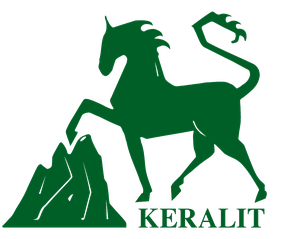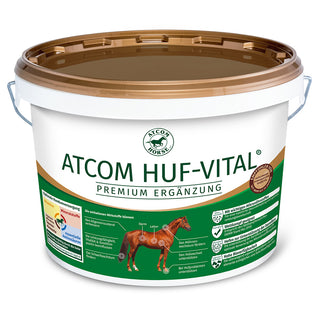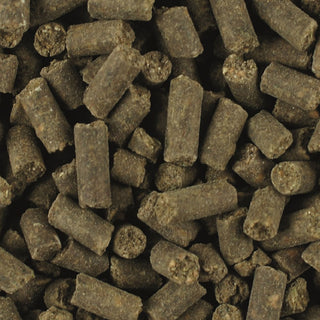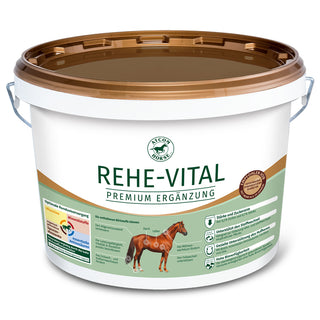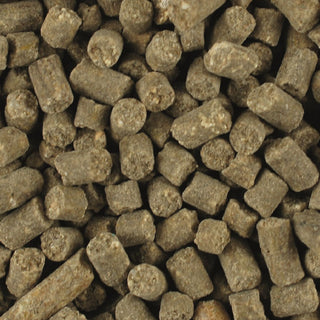Our horse feed products offer a targeted selection of high-quality foods that have been specially selected to optimally support the health and well-being of your horse. With our many years of expertise , we can help you find the ideal feed supplement for your horse. Discover our three carefully selected products and choose the perfect solution for your horse's individual needs.
Why is the digestion of horses and the right feed so important?
Originally, the horse is a steppe animal that spends up to 16 hours a day covering its food requirements. In order to find enough food in the steppe, the original wild horses roamed large areas of land. The constant movement and slow feed intake are particularly digestible for the gastrointestinal tract and mobilize the intestinal motor system. Nowadays, it is our job to feed the horses in such a way that it is as well adapted to their needs as possible and incorrect feeding is avoided.
Which horse feed is best for my horse?
How do I find the right horse feed for my horse?
First and foremost, it is important to pay attention to the physical performance you want your horse to achieve. A sport or breeding horse has a much higher energy requirement than a leisure horse that does light work two or three times a week. Many feed manufacturers offer suitable, already mineralized feed for every performance level and type of work. It is important to follow the feeding recommendations so that the horse consumes the right amount. In addition, the breed, age and health condition also determine the amount and type of feed the horse needs. If you are unsure which feed is suitable, you can obtain free feed advice from the respective manufacturer's experts.
How can the right horse feed help with health problems?
If you have a horse with a health problem, in addition to visiting the vet, you also want to give it the best possible nutritional support. There are countless types of horse feed and feed supplements on the market that promise to keep horses healthy. It is often difficult to decide which feed supplement is the right one.
In general, the correct feeding of roughage, concentrated feed and minerals is the basic building block for a healthy horse . If health problems arise, it is always advisable to have a blood count carried out to identify any vitamin or trace element deficiencies and to compensate for them with a suitable feed supplement.
Feed for high-quality nutrition for horses
A sugar-free source of energy
offers our Keralit Muscular. In addition to rice germ oil and gamma oryzanol for muscle building, it also contains vitamin C, which boosts the horse's vitality. Keralit Muskular is ideal for horses, ponies and dogs. It supports animals with an increased energy requirement such as
e.g. sport horses, broodmares and stallions, as well as older and weakened animals.
For slow-growing or
poor quality horn material, we recommend using the ATCOM HUF-VITAL®.
ATCOM REHE-VITAL® is recommended for horses and ponies with laminitis or at risk of laminitis. The feed offers a precisely tailored supply of minerals and vitamins to provide optimum support for the body.
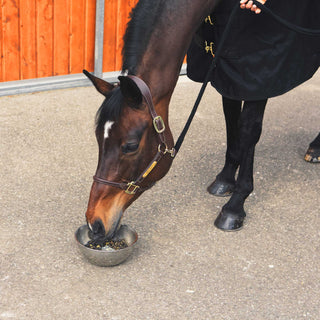
Concentrated feed
The amount and frequency of concentrate feeding depends on how much concentrate a horse needs. If you want to feed your horse a small amount, one feeding is sufficient. Larger quantities should be divided into several portions (e.g. 3 times a day) so that the stomach is not overloaded.
In general, however, horses in the same stable should be fed together, as otherwise this will inevitably lead to unrest and food envy. If there is an intolerance or allergy or the horse is not allowed to eat grain for health reasons such as laminitis or stomach problems, the feed market offers numerous grain-free feed alternatives. This means that no horse has to go without concentrated feed.
Hay before the concentrated feed
It is crucial for good stomach health that the horse has been able to eat hay for at least half an hour before being given concentrates. The saliva produced by the chewing activity makes the concentrated feed much easier to digest. Rule: No concentrates on an empty stomach!
Hidden sugar - keep your eyes open!
The right choice of concentrated feed is an issue that is often given too little attention. Many mueslis, pellets and treats contain a lot of molasses, which is harmful to the horse's digestive tract and teeth in the long term. It is important to check the declaration of ingredients before buying.
Mineral feed
In addition to the daily roughage and concentrate feed, care should be taken to ensure a balanced supply of vitamins and minerals. It is particularly important to give high-quality mineral feed and vitamins to horses that are only fed oats as concentrated feed. Oats contain a lot of phosphorus. This is not primarily harmful to the horse as long as sufficient calcium is provided via the mineral feed.
If there is an imbalance here, the horse's body cannot absorb enough calcium. If the horse is already being fed mineralized concentrates, there is no need to give it additional mineral feed as long as it receives the prescribed amount. If the horse receives little of the already mineralized feed, additional mineral feed makes sense.
Grazing grass
Spring is here and you would love to let your horse out to pasture all day long. However, there is a great danger here. The gastrointestinal tract first has to get used to the fresh grass, as the horse has not eaten grass all winter. In addition, young grass is particularly high in fructan. This sugar can quickly lead to metabolic diseases such as laminitis , especially in sensitive horse breeds. Ponies, small horse breeds and cold-blooded horses are particularly sensitive to this.
Pasture grass contains the most fructan in the early hours of the morning, especially in spring. As the day progresses, the fructan content slowly decreases again. It therefore makes sense to start grazing at midday or in the afternoon. To ensure that your horse gets used to grazing gently, it should be introduced slowly.
One example:
For the first two to three days, you can let them graze for approx. 10 to 15 minutes a day. Then increase the feeding time by approx. 10 minutes every two days. Once you have reached an eating time of one hour, you can let most horses graze for half an hour longer every few days. The speed at which a horse is grazed is highly dependent on the type of horse and its health. Grazing should not take place any faster than listed above.
Importance of drinking water - checking the drinking trough
The horse's organism consists of two thirds water. In order to keep all metabolic functions, the gastrointestinal tract, the circulation and all vital organs intact, the constant availability of clean drinking water is essential.
The water requirement of a large horse is up to 60 liters per day. The amount of water required also depends on whether the horse only eats dry feed or whether it has already covered part of its water requirement with lush grass. It is extremely important to check water troughs daily and clean them if necessary. Often something is overlooked here and the horse consumes too little or no water for several hours or days.
Is my horse drinking enough?
If you are not sure whether the horse is drinking enough from its trough, there is a simple trick: draw a fold of skin on its neck. If the fold of skin remains in place for a short or longer period of time and only slowly lowers again, the horse has not drunk enough. If the fold of skin smoothes out immediately, the horse is well hydrated.
